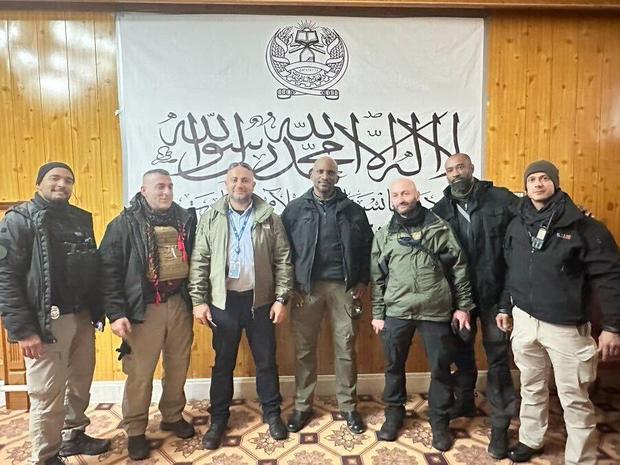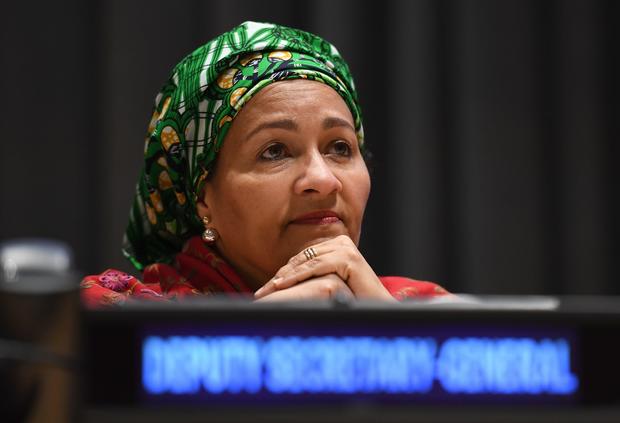Top U.N. women’s visit to pressure Afghanistan’s Taliban on rights marred by security team’s poorly planned photo op
The United Nations apologized Friday for photos posted online of a senior delegation’s security detail posing in front of the Taliban flag during a visit to Afghanistan this week. But U.N. deputy spokesman Farhan Haq told CBS News the photos “should never have been taken.”
The awkward incident highlights the tightrope the international community is trying to walk as Afghans suffer through a harsh winter with their long-vital international aid lifeline all but severed due to the Taliban’s draconian crackdown on human rights.
Unknown
Neither the U.N. nor the vast majority of governments around the world have formally recognized the Taliban regime that retook power in the country with the U.S. military coalition’s swift withdrawal in August 2021. Most governments, including that of the U.S., are loathe to provide any financial assistance that could bolster the hardline Islamic group’s power, and they have frozen millions of dollars in Afghan government cash reserves held overseas.
But the lack of incoming aid is only half of the problem for Afghanistan this winter. Since taking back power, the Taliban has methodically erased virtually all of the basic human rights gained by Afghan women and girls during the two-decade U.S.-led war that drove them from power in the country. Women have been barred from attending universities and most high schools, and from working for non-governmental organizations.
After an international uproar, that edict was revised slightly to allow women to work in the health care industry, where there’s an urgent need for female doctors and nurses. But the other bans on women and girls remain in place.
Losing such a huge portion of the workforce has crippled aid agencies, including the U.N.’s own, which for more than 20 years had propped up Afghanistan’s weak economy and basic food and health infrastructures.
The Taliban has not wavered in the face of tremendous international pressure to ease its restrictions on women, dismissing the calls as a “politicization” of human rights. The group’s leaders have repeatedly insisted that they will rule Afghanistan according to their harsh interpretation of Islamic law, without compromise.
“A good thing,” but no breakthrough
In a bid to pressure the Taliban to ease its restrictions on women, the United Nations sent a delegation led by two of its most senior female — and pointedly, Muslim — leaders to the country this week.
Deputy Secretary General Amina Mohammed led the mission, along with Sima Bahous, the head of the U.N. Women agency. After visiting a number of other Muslim majority nations and meeting the leaders of Islamic organizations to build solidarity and present a united voice against the Taliban’s anti-women policies — which have been condemned for months as anti-Islamic — the delegation arrived in Kabul in the middle of this week.
ANGELA WEISS/AFP/Getty
They were there to meet Taliban leaders and women’s groups for discussions on “women’s and girls’ rights and coexistence,” according to the U.N.
After the mission, Mohammed told BBC News on Friday that most of the senior Taliban officials she’d met appeared ready to engage in a discussion on women’s rights, but she indicated no serious breakthroughs, or even major progress, on getting the country’s rulers to back down on their policies.
“I think there are many voices we heard, which are progressive in the way that we would like to go,” Mohammed told BBC. “But there are others that really are not.”
“I think the pressure we put in, the support we give to those that are thinking more progressively, is a good thing,” she said. “This visit, I think, gives them more voice and pressure to help the argument internally.”
In a statement provided by the U.N. later Friday, Mohammed said the restrictions reintroduced by the Taliban “present Afghan women and girls with a future that confines them in their own homes, violating their rights and depriving the communities of their services… Right now, Afghanistan is isolating itself, in the midst of a terrible humanitarian crisis and one of the most vulnerable nations on earth to climate change.”
“We must do everything we can to bridge this gap,” she said.
The U.N. leaders met with the Taliban deputy prime minister in Kabul, and a senior regional official in the group’s heartland in the province of Kandahar, but it was not clear whether the prime minister had met the women, and a meeting with the Taliban’s supreme leader, Hibatullah Akhundzada, was never on the cards.
“Afghan women left us no doubt of their courage and refusal to be erased from public life. They will continue to advocate and fight for their rights, and we are duty bound to support them in doing so,” Bahous said in the statement from the U.N., calling the last year and a half in Afghanistan “a grave women’s right crisis and a wakeup call for the international community. It shows how quickly decades of progress on women´s rights can be reversed in a matter of days.”
A “mistake”
Haq, the U.N. deputy spokesman in New York, said the series of photos that emerged of the delegation’s security detail smiling under the Taliban’s white flag had been taken “while the Deputy Secretary-General was meeting the de facto leaders in Afghanistan.”
“The photo should never have been taken. It was a mistake, and we apologize for it,” said Haq.
In one of the photos, one of the security team is seen pointing at the Taliban flag on a wall behind the group. Similar versions of the same flag, a plain black or white banner with Arabic script reading: “There is no God but Allah, and Mohammed is his messenger,” are used not only by the Taliban, but frequently in ISIS propaganda photos after one of the group’s members carries out an attack or pledges allegiance.
“Foreign men with UN badges pose in photos in front of Taliban’s flag as they smile. Under this same flag, women are erased and the people of Afghanistan are starved and deprived of basic rights and dignity,” said one of the many critics of the photos, which were shared widely on social media, on Twitter. “Well done UN.”
For all the latest World News Click Here
For the latest news and updates, follow us on Google News.



